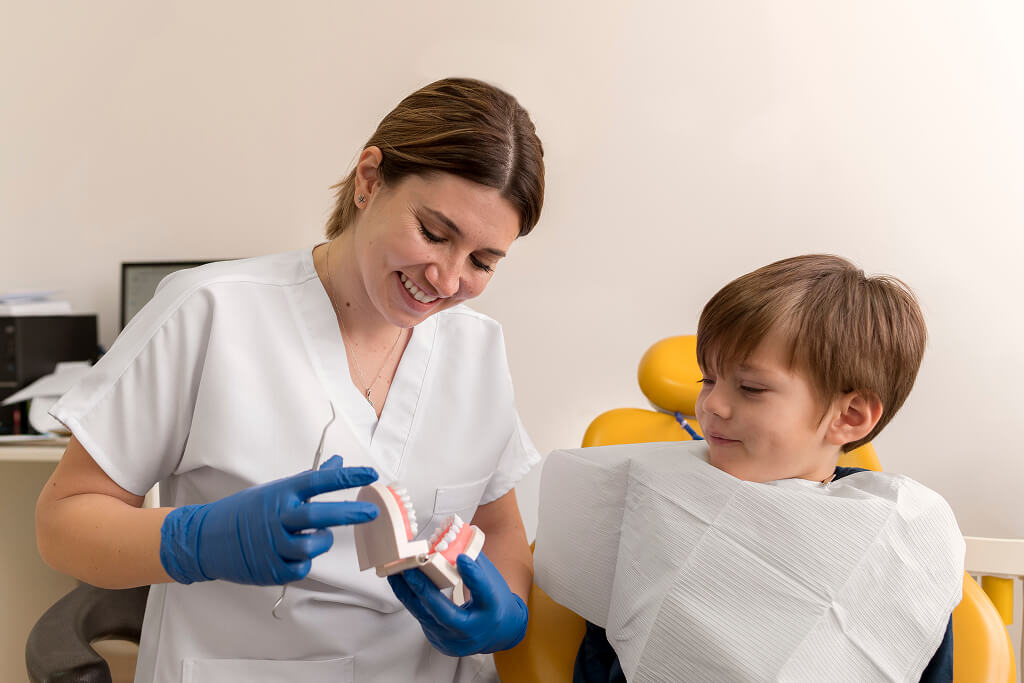Teeth grinding, also known as bruxism, is a common yet often overlooked issue in children. While many parents may think it’s a harmless habit, it can cause significant long-term damage to a child’s teeth and jaw if left unchecked. Unlike adults, children may not be able to articulate the discomfort they experience from grinding, making early detection crucial. This behavior is often mistaken for simple teething or growing pains, but it’s important to recognize that grinding can stem from various causes, including emotional stress, misaligned teeth, and even sleep disorders.
Understanding how to stop kids from grinding their teeth is not only essential for preserving their smile but also for promoting overall oral health and well-being. This article will delve into the causes, signs, and practical strategies that can help parents protect their child’s teeth from the harmful effects of bruxism.
What Is Teeth Grinding (Bruxism) in Children?
Teeth grinding, or bruxism, refers to the involuntary clenching or grinding of teeth, typically during sleep, although some children may grind during the day. While occasional grinding is relatively common in young children, persistent bruxism can lead to significant dental issues, including worn-down enamel, jaw pain, and even misaligned teeth over time. Interestingly, teeth grinding in children often occurs during periods of growth and development when new teeth emerge or when changes in their physical or emotional environment occur.
Unlike adults who may grind teeth due to stress or anxiety, children may not always show outward signs of distress when grinding, making it difficult for parents to identify the problem. The effects of bruxism can vary—some children experience mild tooth wear, while others may develop more serious complications such as temporomandibular joint (TMJ) issues or cracked teeth.
The Main Causes of Teeth Grinding in Children
Teeth grinding in children can be caused by a combination of physical, emotional, and environmental factors. While many of these causes are widely recognized, some are less commonly discussed in the dental field:
- Teething and Tooth Development: The eruption of new teeth or the loss of baby teeth can lead to discomfort, causing children to grind in an attempt to relieve pressure.
- Unnoticed Sleep Disorders: Issues like sleep apnea or snoring can interfere with deep sleep, causing children to grind their teeth as their body seeks comfort or attempts to open airways.
- Nutrient Deficiencies: Deficiencies in minerals like magnesium or calcium, which are vital for muscle function, can lead to increased tension in the jaw muscles, triggering bruxism.
- Hyperactivity or Restlessness: Children with high energy levels or those experiencing heightened levels of restlessness might grind their teeth as a physical outlet.
- Emotional Stress from Subtle Sources: Even low-level stressors like changes in routine, school pressures, or sibling rivalry can result in bruxism, though it’s not always immediately recognized as stress-related.
Recognizing the Signs of Teeth Grinding in Children
Recognizing the signs of teeth grinding in children can be challenging, especially since many symptoms appear during sleep or are subtle. One of the first signs that parents may notice is unexplained jaw pain or tenderness, particularly when the child wakes up in the morning. Children may also complain of headaches, particularly those centered around the temples or forehead, which can be linked to tension from grinding. Another often-overlooked symptom is worn or flattened teeth, especially in the back molars.
This can indicate excessive grinding or clenching during sleep. Parents should also look for signs of irritability or difficulty concentrating, as grinding can disrupt sleep cycles, leading to fatigue. In some cases, children may exhibit clicking or popping sounds when opening or closing their mouth, signaling that bruxism may be affecting the jaw joint. These signs often go unnoticed, but early detection is key to preventing long-term damage.

How to Stop Kids From Grinding Teeth
- Establish a consistent bedtime routine: One effective but often overlooked method is creating a bedtime routine that helps children relax before sleep. A warm bath, reading, or calming music can significantly reduce stress and anxiety, which are common triggers for bruxism.
- Address dietary habits: Limiting sugar and caffeine, especially before bedtime, can help reduce the likelihood of grinding. These substances can increase muscle tension, making bruxism more likely.
- Improve sleep hygiene: For children who grind due to sleep disorders, improving sleep hygiene by creating a quiet, dark environment and ensuring consistent sleep schedules can help prevent grinding episodes.
- Use custom dental night guards: Although often seen as a last resort, custom dental night guards can protect teeth while also providing relief from discomfort.
- Address emotional or psychological stress: In more severe cases, seeking professional help, such as therapy or mindfulness techniques, can help children manage anxiety that might otherwise manifest as teeth grinding.
When to Consult a Pediatric Dentist About Teeth Grinding
It’s important to consult a pediatric dentist about teeth grinding when signs of bruxism persist or worsen, especially if they are causing physical discomfort or dental damage. If your child constantly complains of morning jaw pain or headaches, or if you notice visible wear on their teeth, it may be time for a professional evaluation. Additionally, if your child’s grinding is associated with sleep disturbances, such as snoring or difficulty staying asleep, a pediatric dentist can help assess whether an underlying sleep disorder, like sleep apnea, is contributing to the problem. Parents should also seek advice if the grinding is accompanied by irritability or behavioral changes, as these could indicate heightened anxiety or stress.
Early intervention is crucial, not just to protect the teeth, but to address any emotional or physical issues that might be exacerbating the grinding. A pediatric dentist can provide tailored recommendations to prevent long-term damage and improve your child’s overall well-being.
Final thoughts
Teeth grinding in children is a common yet often overlooked issue that can have lasting effects on their oral health if left untreated. By recognizing the signs early and understanding the underlying causes, parents can take proactive steps to prevent damage and help their children find relief. Whether through establishing healthier sleep habits, managing stress, or using dental night guards, addressing bruxism early is key to preserving a child’s smile.
If you’re concerned about your child’s teeth grinding or need professional guidance, the team at Ballantyne Pediatric Dentistry is here to help. Visit us or call 704-752-1900 to schedule an appointment today.

